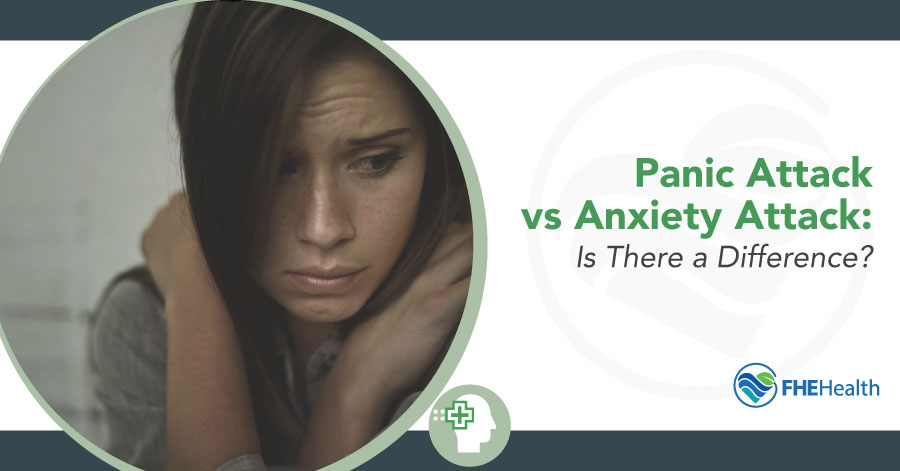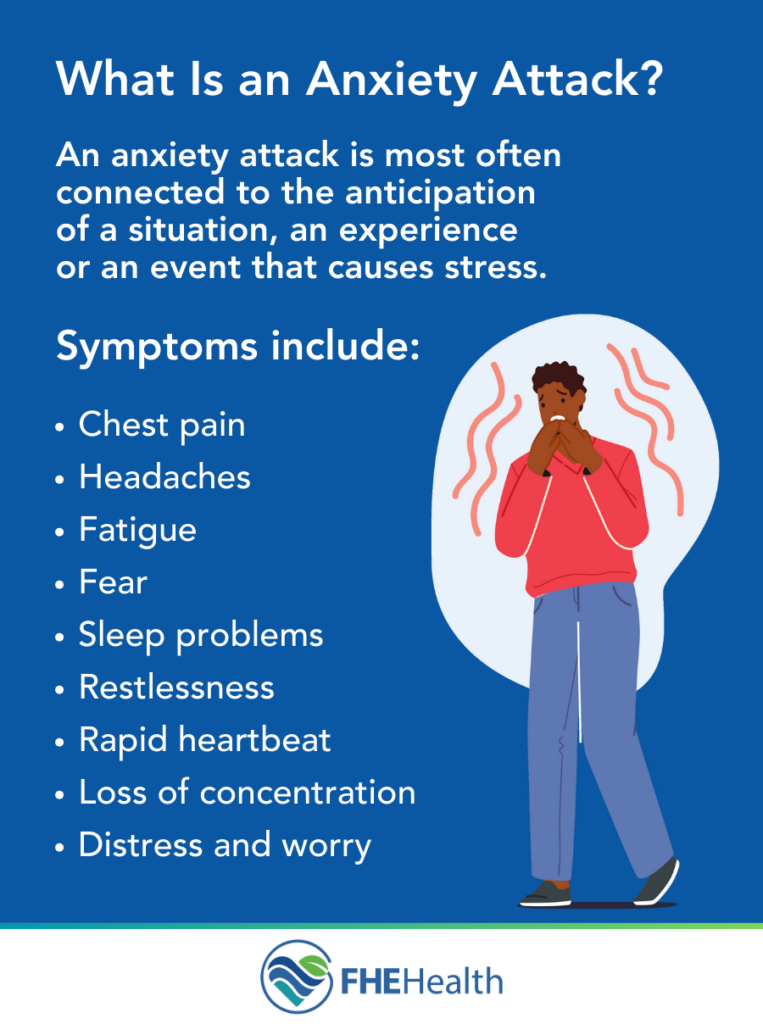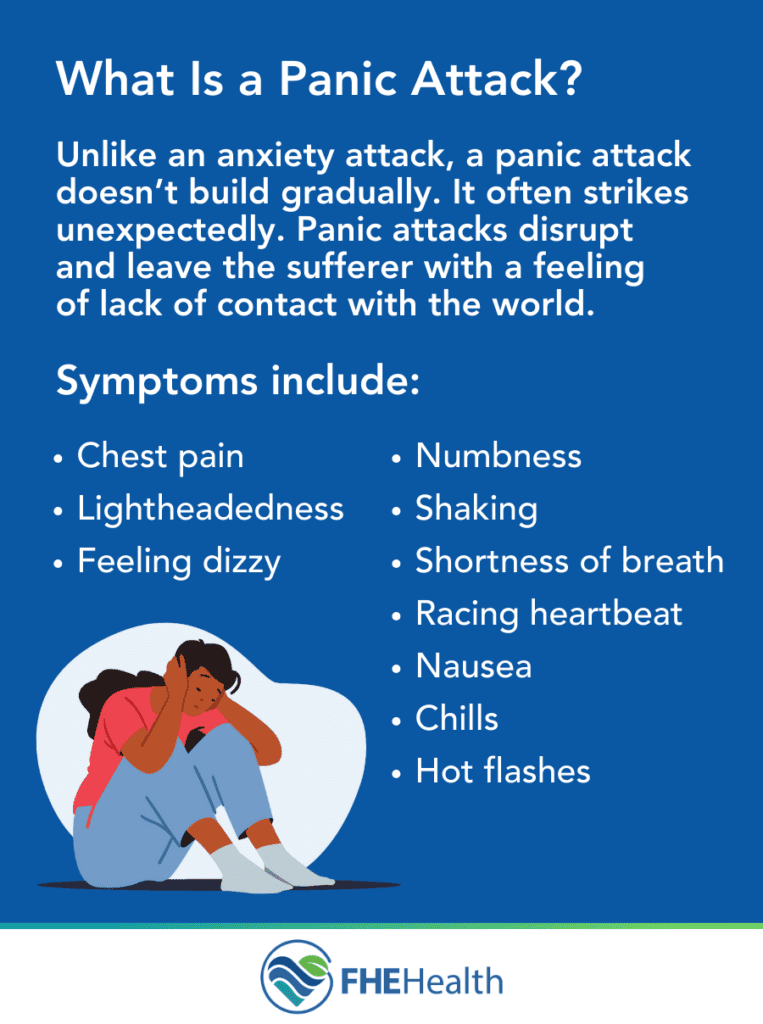
You may have friends who’ve told you they’re having an anxiety attack during a stressful situation. Another friend may have told you about a scary moment during a panic attack. You could be forgiven for assuming both friends were describing the same thing. But they’re not. A panic attack and an anxiety attack can have very different causes and outcomes.
Did I have a panic attack?” is a question many people have probably asked themselves during their lives. That feeling of loss of control that comes with high anxiety caused by being in a very stressful situation or suddenly out of the blue can have a disruptive effect. Everyone has likely felt anxiety or even panic at some point in their lives, but it was an isolated event. More frequent anxiety attacks or panic attacks signal deeper issues.
Panic Attack vs Anxiety Attack
The difference between an anxiety attack and a panic attack can be found in the Diagnostic and Statistical Manual of Mental Disorders (DSM-5). Healthcare professionals worldwide use the DSM as the standard guide for the diagnosis of mental disorders.
The DSM doesn’t describe an anxiety attack as a stand-alone psychological disorder. It defines anxiety as a symptom of several common mental illnesses. Anxiety attacks are often associated with a triggering event or numerous mental health conditions such as trauma, depression or obsessive-compulsive disorder.
The authors of the DSM, on the other hand, recognize panic attacks as a component of a panic disorder. They’re usually more intense than anxiety attacks, and a panic attack can strike a person out of the blue.
What Is an Anxiety Attack?
An anxiety attack is most often connected to the anticipation of a situation, an experience or an event that causes stress. (Waiting for a meeting to ask your boss for a raise or an interview for a new job can cause anxiety.) Anxiety attacks are a response to a threat or a perceived stressful situation.
Typically, the symptoms of an anxiety attack are less intense than those experienced in a panic attack. Anxiety attacks increase gradually, becoming more intense over time. Anxiety attacks can last minutes, hours, or days.
Symptoms of an anxiety attack include:
- Chest pain
- Headaches
- Fatigue
- Fear
- Sleep problems
- Restlessness
- Rapid heartbeat
- Loss of concentration
- Distress and worry
 While not as intense as the symptoms of a panic attack, the symptoms of an anxiety attack can persist for long periods, often lingering just below the level of consciousness.
While not as intense as the symptoms of a panic attack, the symptoms of an anxiety attack can persist for long periods, often lingering just below the level of consciousness.
Many well-known celebrities have spoken publicly of suffering from anxiety attacks. Well-known singers like Lady Gaga and Selena Gomez and famous actors such as Emma Stone and Gina Rodriguez have talked about their anxiety problems.
“I’ve had a lot of issues with depression and anxiety, and I’ve been very vocal about it, but it’s not something I feel I’ll ever overcome,” Gomez told Harper’s Bazaar in 2018. “I want to make sure I’m healthy. If that’s good, everything else will fall into place.”
Athletes are not immune from anxiety. Terry Bradshaw, the star quarterback of the Pittsburgh Steelers, struggled with anxiety during his playing days. Terry Sawchuk, the brilliant NHL goalie of the 50s and 60s, always vomited before a game, even an unimportant one
What Is a Panic Attack?
Unlike an anxiety attack, a panic attack doesn’t build gradually. It often strikes unexpectedly. Panic attacks disrupt and leave the sufferer with a feeling of unreality or lack of contact with the world. People who experience panic attacks feel like they’ve lost control or they’re going crazy. They can believe they’re about to die. Fortunately, panic attacks often subside quickly.
Panic attack symptoms include:
- Chest pain
- Lightheadedness
- Feeling dizzy
- Numbness in the fingers or toes
- Shaking
- Shortness of breath
- Racing heartbeat
- Nausea
- Chills, or the opposite, hot flashes
 While panic attacks usually don’t last very long, individuals can suffer several panic attacks in succession, leaving a feeling that the attack has lasted for a long time. After a panic attack, many people can’t resume normal activities until the next day or later in the week.
While panic attacks usually don’t last very long, individuals can suffer several panic attacks in succession, leaving a feeling that the attack has lasted for a long time. After a panic attack, many people can’t resume normal activities until the next day or later in the week.
As with anxiety attacks, well-known celebrities have also spoken publicly about dealing with panic attacks. Actress Amanda Seyfried, singer John Mayer, and TV host and personality Oprah Winfrey have described suffering from panic attacks at some point in their lives.
“I still do get terribly nervous, and that’s partly due to the fact I think too much and overanalyze things,” Seyfried told the British edition of Glamour. “I’ll start worrying about my parents or my dog, and I’ll picture him opening the window of my apartment and falling out, even though I can’t get that thing open myself.”
Treatment Options
Doctors can’t diagnose anxiety attacks or when they will happen, but they can diagnose symptoms of anxiety or mental illnesses that may cause anxiety. Doctors can diagnose panic attacks and their connection to panic disorders.
The first thing doctors will do with anxiety or panic attacks is evaluate your situation to determine if other health conditions might cause these symptoms. These evaluations include a physical exam, a blood test, an EKG, and a psychological questionnaire.
Treatment options include cognitive behavioral therapy, which can help you develop strategies for dealing with triggers for anxiety attacks and the causes of panic attacks. Exposure therapy is another option where doctors control exposure to triggers that cause fear and anxiety and help the patient confront them.
Doctors may also prescribe medications like antidepressants, beta-blockers to help with panic attacks and antianxiety drugs that can help suppress symptoms quickly.
Self-Help Strategies
Individuals who suffer from anxiety attacks or panic attacks can reduce the stressors in their lives and can think about what triggers an attack and try to avoid those situations. Reducing alcohol and caffeine can be helpful, and eating balanced meals is important. Exercising every day is very helpful, as are meditation, yoga, deep breathing, and mindfulness. One of the essential self-help remedies is to build a support network of family and friends you can contact when you have a panic or anxiety attack and who can help.
If you regularly have panic or anxiety attacks and they’re playing havoc with your life, the sooner you seek help, the better your chances of finding a strategy to reduce the symptoms. We can help you. Our compassionate counselors are available 24/7 to help get you back on the road to dealing with anxiety or panic attacks. You can reach us at (833) 596-3502.






